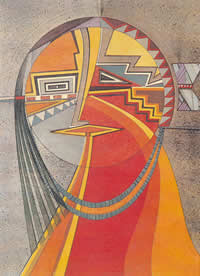Presenter: Kate T. Donohue, Ph.D., R.E.A.T.
“The artist appeals to that part of our being…. which is a gift and not an acquisition and therefore more permanently enduring.”
– Joseph Conrad
Personal images and archetypal symbols guide us through our lifelong journey of individuation. To grasp our full potential, we must also journey through the Motherline, the unconscious feminine legacy of one’s family: personally, culturally, creatively and spiritually. Using the life and transcendent images of bi-cultural Southwest artist Helen Hardin, we will explore the process of individuation through the Motherline. We will delve into the personal, maternal, cultural and spiritual paradoxes that molded her experience and explore the dynamic of bridging these paradoxes, the transcendent function. By contrasting her early childhood development to her adult behavior, we see the compensatory function at work. Through her images, we see how she formed a relationship with her shadow, her animus and to the sacred. She allowed her exploration of her Motherline, the unconscious feminine legacy, to lead her to numinous experiences and transcendent Tewa and universal images of the feminine. She called these images her feminine trinity: Changing Woman, Medicine Woman and Listening Woman. They combine universal themes and Tewa spiritual legends. With these images, Helen Hardin created her own mythology.
By using expressive arts therapy process, participants will delve into their own richly layered and complex Motherline journey of individuation. Using poetry, visual arts and movement, each participant will have the opportunity to explore bi-cultural issues, the dualities and injuries in his/her family, shadow relationships within the family’s feminine line, spiritual wounds and the complex interactions one has with the world as an artist. They will also have the opportunity to explore their compensations for these injuries in their adult lives as well as to explore the passions that have difficulty being expressed in their outer lives. Particpants will also learn how to bring these processes into their clinical work.
Through the sharing of the images created during this workshop, participants will find their own personal relationship with the sacred feminine and the universal themes of the mother-line that emerge through those images. In closing, we will come together to create useful processes to keep the relationship to the feminine alive in our lives and into the lives of those with whom we work.
Learning objectives:
In this workshop, participants will learn about:
- the Jungian concept of the individuation process, the process of becoming whole and its application to their clinical practice
- the Jungian concept of the mother-line, the feminine unconscious legacy to the family and its application to clinical practice
- learn about Tewa themes of spirituality and the application the spiritual beliefs in their client’s individuation process
- the transcendent journey of a creative personality through the mother-line, and apply this understanding to therapeutic processes.
- how to use expressive arts therapy processes by creating images of mother-line, exploring one’s experiences of paradox, precision and passion.
- the relationship between the individuation process, expressive arts therapy and the Sacred Feminine.
- the use of expressive arts therapy group process through the sharing of poetic, visual and kinesthetic images the collective, universal images of the mother-line.
Course Readings:
Allen, P. G. (1991). Grandmothers of the Light: A Medicine Women’s Sourcebook. Boston: Beacon Press.
Allen, P.G. (1986). The Sacred Hoop: Recovering the Feminine in American Indian Traditions. Boston: Beacon Press.
Chodorow, J. (ed.) (1997). Jung On Active Imagination. Princeton, New Jersey: Princeton University Press.
Donohue, K. T. (1995). “Paradox, Precision and Passion: Passing on the Spirit of Helen Hardin, 1943-84”. The San Francisco Jung Institute Library Journal. 14(3), 31-42.
Fergusson, E. (1931). Dancing Gods: Indian Ceremonies of New Mexico and Arizona. Albuquerque, New Mexico: University of New Mexico Press.
Hansen, M. T. (1997). MotherMysteries. Boston: Shambhala Press.
Jung, C.G. (1964). Man and His Symbols. New York: Dell Publishing Company.
Knill, P.J., Barba, H.N., and Fuchs, M. N. (1995) Minstrels of Soul: Intermodal Expressive Therapy. Toronto, Ontario, Canada: Palmerston Press.
Levine, S. and Levine, E (eds.). (1999). Foundations of Expressive Arts Therapy: Theoretical and Clinical Perspectives. Philadelphia, Pa.: Jessica Kingsley Publishers.
Lewis, P. (1993). Creative Transformations: The Healing Power of the Arts. Wilmette, Illinois: Chiron Publications.
Lowinsky, N. R. (1992). Stories From the Motherline. Los Angeles, CA.: Jeremy Tarcher, Inc.
Neumann, E. (1959). Art and the Creative Unconscious. Princeton, New Jersey: Princeton University Press.
Neuman, E. (1963). The Great Mother. Princeton, New Jersey: Princeton University Press.
Ortiz, A. (1969). The Tewa World: Space, Time, Being and Becoming in a Pueblo Society. Chicago: The University of Chicago Press.
Parsons. E. C. (1939). Pueblo Religion. Volume 1. Lincoln, Nebraska: University of Nebraska Press.
Parsons. E.C. (1939). Pueblo Religion. Volume 2. Lincoln, Nebraska: University of Nebraska Press.
Parsons, E. C. (1994). Tewa Tales. Tucson, Arizona: The University of Arizona Press.
Ryan, M. J. (ed.) (1998). The Fabric of the Future: Women Visionaries of Today Illuminate the Path to Tomorrow. Berkeley, CA.: Conari Press.
Singer, J. (1973). Boundaries of the Soul: The Practice of Jung’s Psychology. New York: Doubleday.
Spinden, H. J.(trans.) (1976). Songs of the Tewa: A Collection of Home Songs, Sacred Chants, Ceremonial Songs and Magic Songs and Prayers. Santa Fe, New Mexico: The Sunstone Press
Stein, M. (1998). Transformations: Emergence of the Self. College Station, Texas: Texas A & M University Press.
Tyler, H. A. (1964). Pueblo Gods and Myths. Norman, Oklahoma: The University of Oklahoma Press.








